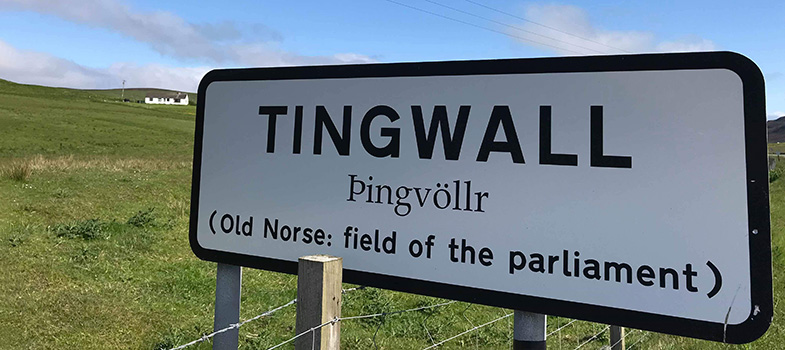5.4 Scots: Parliamentary discussion
The parliamentary debate you studied in section 5.3 is a rare example of Scots being used in Parliament. This debate was also memorable as it was a very passionate discussion of issues regarding the use and importance of the Scots language in Scottish culture. Therefore, it is worth reading/listening to more of the Scots spoken in that particular debate. You can watch the debate [Tip: hold Ctrl and click a link to open it in a new tab. (Hide tip)] or read the substantially verbatim written record of the debate in the Official Report. The closing speech delivered by The Minister for International Development and Europe, Dr Alasdair Allan (SNP), exhibits particularly rich Scots.
In general, however, with the exception of motions or questions that are consciously about Scots, it is very rare to see Scots in written form in the Scottish Parliament. Similarly, with the exception of oath-taking or debates or questions that are consciously about Scots, it is very rare to hear broad Scots being spoken in the Scottish Parliament. It is not uncommon, however, to hear the odd piece of Scots vocabulary, phraseology, or grammatical constructions within otherwise English sentences.
The Official Report of the debate you have engaged with, records, for example, usage of such words as stramash; blether; wisnae; daft-lassie question; high heid yins; and wrang - within otherwise English sentences. The reason why this is the case lies in the Scots language policy. The Official Report is the written record of the proceedings of the Scottish Parliament. The SPCB Language Policy states that: 'when Scots is used in meetings of the Parliament and committee meetings, the Official Report incorporates that language in the body of the text' (SPCB Language Policy, p. 3).
Activity 9
Part 2
Listen to the recording of this statement and then record yourself speaking these three sentences. This time, try not to read the sentences from the page but speak them from memory. This will help you improve your pronunciation and intonation and it will make your Scots sound more natural.
Transcript
Listen
Fit is so wrang wi wantin to speir as part o the census aboot foo much money we mak and fit wye we speak at hame. I cannae see oniethin wrang wi that. I havenae heard onie argument today that persuades me itherwise.
Model
Fit is so wrang wi wantin to speir as part o the census aboot foo much money we mak and fit wye we speak at hame. I cannae see oniethin wrang wi that. I havenae heard onie argument today that persuades me itherwise.
By contrast, when Gaelic is used, ‘the Official Report incorporates the Gaelic text before the report of the English interpretation’. And where a language other than English (not Scots or Gaelic) is used, the SPCB policy is ‘normally [to] publish the report of the English interpretation only, with a note to indicate that the text is not in the original language used’ (SPCB Language Policy, p. 3).
Although English is the working language of the UK Parliament, in practice, as in the Scottish Parliament, Scottish MPs will utilise Scots words, phrases and grammatical constructions within their English speech. Hansard, the House of Commons Official Report, records various instances of Scots within otherwise English sentences, such as stramash, bairn, wisnae, weel-kent and blether.
As in the Official Report of the Scottish Parliament, Scots is incorporated without translation.
Consider, for example, the comment of Charles Kennedy MP (Liberal Democrat) during a 2013 debate about the process for Scotland holding a referendum on independence, as recorded in Hansard: ‘in being entrusted with that responsibility, Holyrood must not turn a stooshie into a stramash’ (Hansard, 2013).
Activity 10 
What do you think about the fact that Scots is incorporated in parliamentary business without interpretation?
Answer
This is a model answer. Your answer might be different.
I think it is because of the similarities Scots today has with English. It’s not the same as the need to translate Gaelic. There is probably an assumption that anyone understanding English can also understand Scots – when used in parliament – as many Scots words have been incorporated into the English language today as well.
5.3 Scots: A debate in parliament
